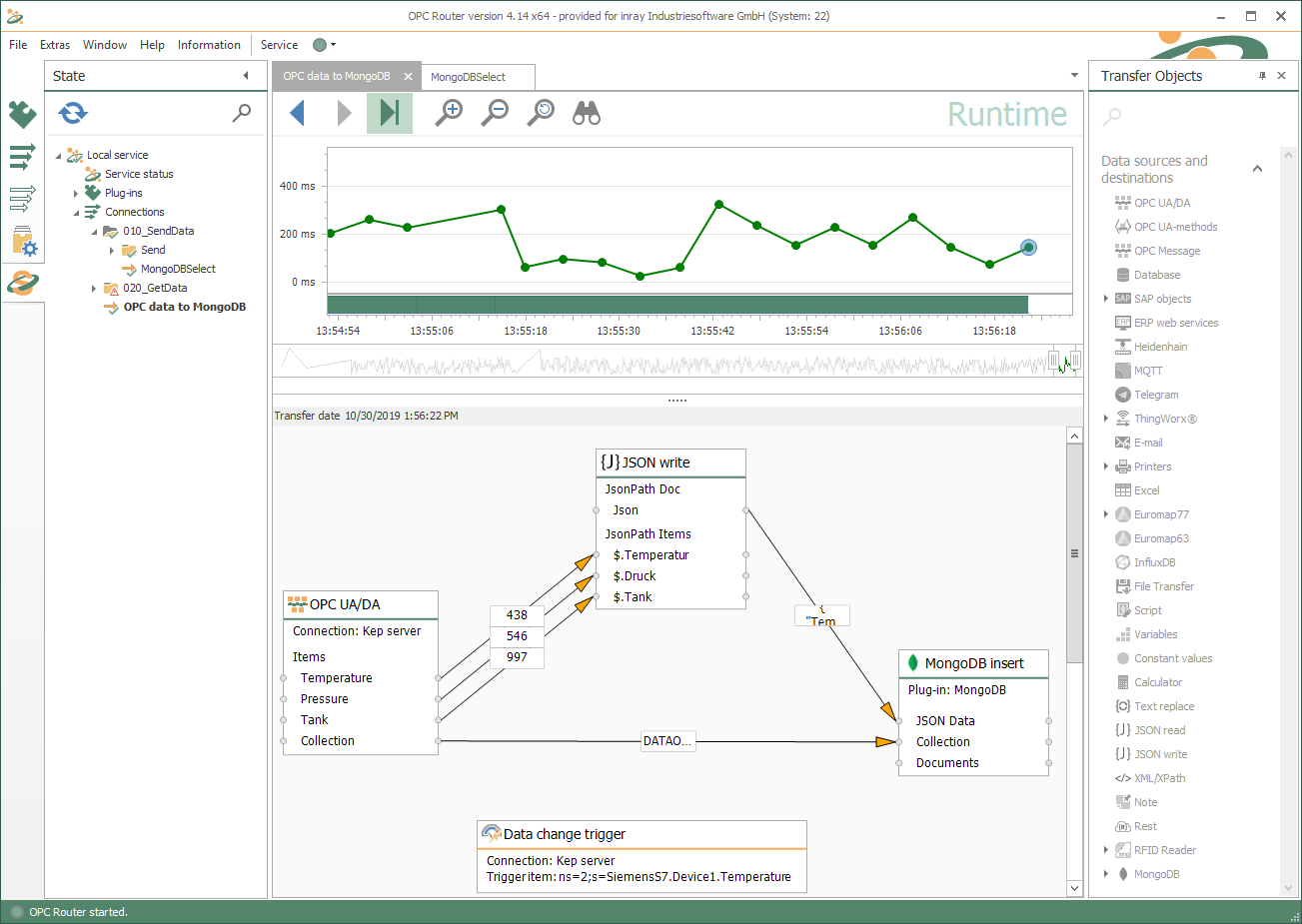MongoDB Client
Connect MongoDB and Industry 4.0
MongoDB database is one of the most used NoSQL databases. The document-oriented database is very well suited for distributed use and the processing of large quantities of JSON documents. With the MongoDB Plug-in of OPC Router it is very easy to connect the infrastructure of industry 4.0 with the MongoDB. OPC Router masters the handling of replicated MongoDB infrastructures. Using various OPC Router plug-ins, data from other systems can be transferred to MongoDB and data from MongoDB can also be made accessible to the systems. You can find a dedicated video about the topic “connection of database systems” by visiting our tutorial stream.

That’s how easy it is.
MongoDB Client via drag & drop
Connecting your systems to a MongoDB is very simple and intuitive with the OPC Router via drag & drop. The screenshot shows an example of an application of the OPC Router and MongoDB. OPC UA data is transferred from a PLC machine to the OPC Router, converted into JSON and then stored in MongoDB.
Bringing Industry 4.0 to life with MongoDB
- Achieving more with coupled systems:
The NoSQL databases and the cloud are designed for large amounts of data (big data) that are stored schematically and are highly available with fast access times. By connecting the automation level, production benefits from these advantages and can thus use new application possibilities (AI, Big Data, Data Analytics, etc.). - Industry 4.0 with MongoDB:
Industry 4.0 means the best possible networking and information supply for all systems involved. With the coupling to MongoDB, a highly efficient data storage for the provision of data is integrated into the industry 4.0 landscape and thus offers the possibility of high scalability. - About OPC Router:
The OPC Router realizes the networking of your systems graphically. A large number of plug-ins make it a data hub in the industrial environment. Simple configuration, sophisticated monitoring and robustness characterize it.
MongoDB application examples

Data acquisition from OPC UA – Realization of process data acquisition, Big Data, AI and digital twin
With its Plug-ins, the OPC Router has access to many data at the automation level and is therefore the ideal source for big data and AI (artificial intelligence) applications based on MongoDB. Regardless of whether as a cloud or as a locally hosted database, the OPC Router forms a link between these two worlds. If, for example, data from OPC UA data sources is captured with an OPC Client Plug-in, it can be transferred to MongoDB as consistent JSON documents. The content of the data packages can be very different and ranges from simple process data to complex data records such as batch information, production messages or information from production for a product for the depiction of a digital twin in the cloud.

NoSQL vs. relational SQL database
Relational databases are the standard for many automation processes. The relational concept also fits these processes very well, since processes are carried out reproducibly with clear specifications and dependencies and the required data always follow a defined scheme. However, these databases are normally stored locally, close to production, in order to guarantee low latencies and good availability. The distribution of data across locations is a complex task for these databases. This is where cloud-based NoSQL databases have their strengths, as they build highly available replications that can handle large amounts of distributed data. In this infrastructure, OPC Router can form the link between the local relational SQL database and the distributed NoSQL database and thus connect the islands of production to a higher-level context.
Connecting Systems
Transfer-Objects
Transfer objects of the MongoDB Plug-in allow data to be exchanged read and write with MongoDB. A separate transfer object is available for each activity (insert, select, update, delete).
Select, Update, Delete
For actions to select, manipulate or delete data, comfortable filters can be created in the transfer object itself. The filter fields are then available at the transfer object for filling in the connection. The queried data, as well as the data required for manipulation, are transferred via a “Data” field. The transfer normally takes place in JSON format, but can also take place in any other format.
Insert
With the Insert Transfer object, the data to be inserted is transferred via the “Data” field as JSON or in any format. The primary key of the data in the MongoDB, the object ID, can be specified, or determined by the database itself. If the ID is to be specified, a corresponding field appears on the transfer object at the input. If an automatic ID assignment is selected, a field for the assigned ID appears at the exit of the transfer object.
Trigger
The MongoDB Plug-in does not have its own triggers. The standard triggers and all available triggers from other Plug-ins can be used to start connections.
Browsing
When configuring the transfer objects and the Mongo DB Plug-in instance, the collections and the databases can be determined by browsing.
Databases
A MongoDB server can contain several logical databases, each of which forms a logically closed area. In MongoDB Plug-in, the databases of a server can be queried and listed. A database has to be selected for each instance of the Plug-in.
Collections
Collections in MongoDB are collections of documents. A collection is comparable to a table in a relational database, where the collection does not specify a schema. When reading and writing data using the transfer objects of the Plug-in, the collection on which the action is executed can be selected from a list of available collections.

